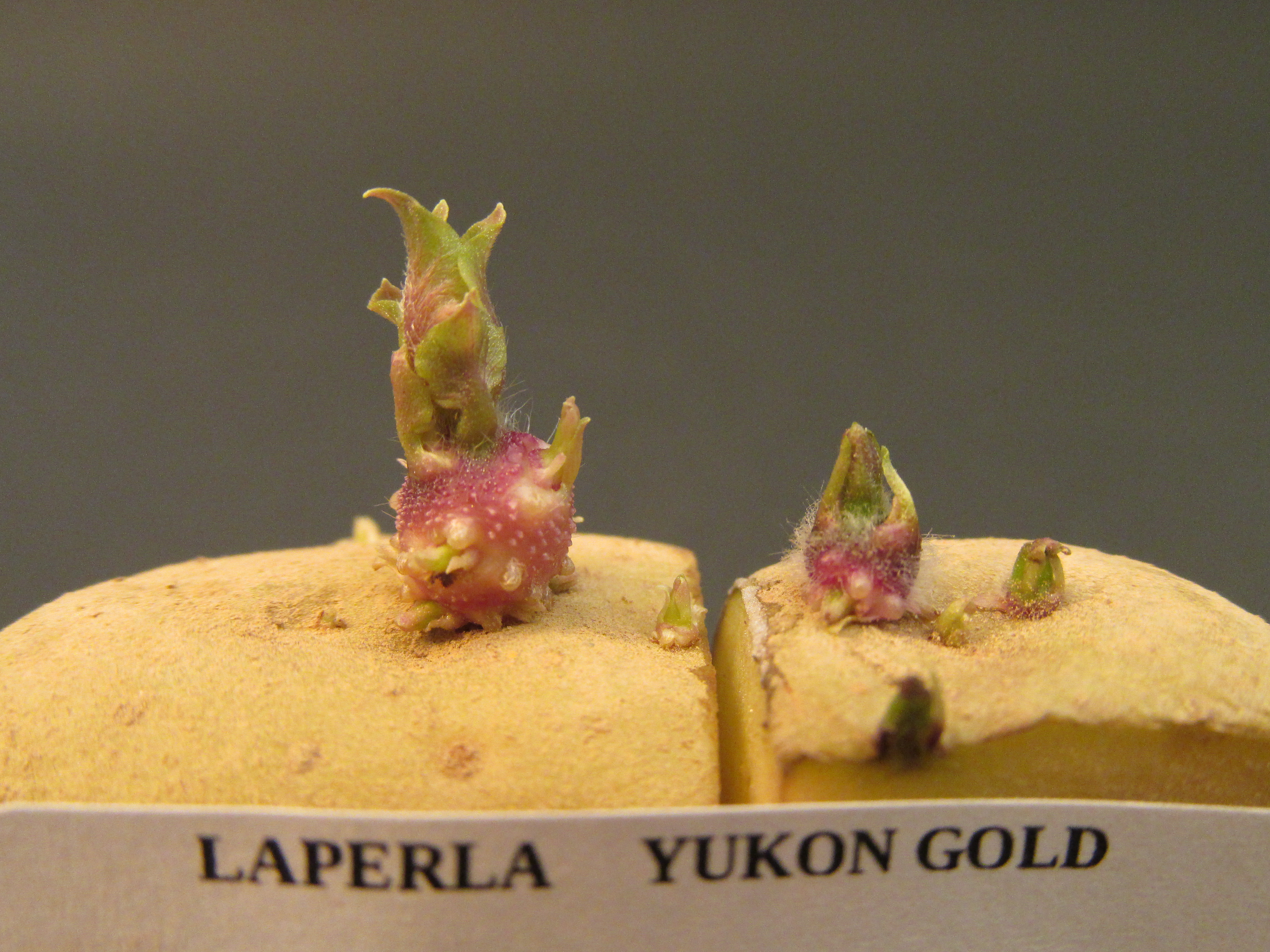Laperla
| Denomination: | 'Laperla' |
|---|---|
| Botanical Name: | Solanum tuberosum |
| Applicant/Holder: |
Aardappelkweek-en Selectiebedrijf Ijsselmeerpolders BV P.O. Box 3 8300 AA Emmeloord Netherlands |
| Breeder: |
B. R. Krijger, Aardappelkweek-en Selectiebedrijf Ijsselmeerpolders BV, Emmeloord, Netherlands |
| Agent in Canada: |
Global Agri Services Inc. 376 New Maryland Highway New Maryland, New Brunswick E3C 1E5 Canada Tel: 506-462-9493 |
| Application Date: | 2013-12-23(priority claimed) |
| Application Number: | 13-8162 |
| Protective direction granted: | 2013-12-23 |
| Grant of Rights Date: | 2016-02-23 |
| Certificate Number: | 5204 |
| Grant of Rights Termination Date: | 2036-02-23 |
Variety Description
Variety used for comparison: 'Yukon Gold'
Summary: The lightsprout of 'Laperla' is medium size with sparse pubescence at the base whereas the lightsprout of 'Yukon Gold' is small with dense pubescence at the base. The tip of the lightsprout of 'Laperla' has a medium density of pubescence whereas it is sparse at the tip on 'Yukon Gold'. The plant of 'Laperla' has a semi-upright growth habit whereas that of 'Yukon Gold' has an upright growth habit. The frequency of coalescence of the terminal and lateral leaflets is high for 'Laberla' whereas the frequency is absent or very low for 'Yukon Gold'. The leaf of 'Laperla' has a strong presence of secondary leaflets whereas the leaf of 'Yukon Gold' has a medium presence of secondary leaflets. The waviness of the leaflet margin is medium to strong for 'Laperla' whereas the waviness is weak for 'Yukon Gold'. The plant of 'Laperla' is taller than that of 'Yukon Gold'. The colour at the base of the eye on the tuber of 'Laperla' is yellow whereas it is red on the tuber of 'Yukon Gold'. In reaction to light, the tuber skin of 'Laperla' develops a weak intensity of anthocyanin colouration whereas the tuber skin of 'Yukon Gold' develops none or a very weak intensity of anthocyanin colouration.
Description:
LIGHTSPROUT: medium size, spherical shape, few root tips, short lateral shoots
LIGHTSPROUT BASE: medium to strong intensity of anthocyanin colouration, absent or low to medium proportion of blue in anthocyanin colouration, sparse pubescence
LIGHTSPROUT TIP: medium size in relation to base, habit is intermediate between closed and open, weak to medium intensity of anthocyanin colouration, medium density of pubescence
PLANT: foliage structure is intermediate between stem and leaf types where foliage is half open and stems are partly visible, semi-upright growth habit, matures early to mid-season
STEM: medium extent of anthocyanin colouration along entire stem
LEAF: medium to large outline, openness is intermediate between closed and open, medium green on upper side, low extent and weak intensity of anthocyanin colouration on midrib of upper side, strong presence of secondary leaflets, high frequency of coalescence of terminal and lateral leaflets
SECOND PAIR OF LATERAL LEAFLETS: medium size, leaflet is narrower than long
LEAFLET: medium to strong waviness of margin, medium depth of veins, glossy upper side, glabrous blade at apical rosette
INFLORESCENCE: medium frequency per plant, small to medium size
PEDUNCLE: medium to high extent of anthocyanin colouration
FLOWER BUD: high extent of anthocyanin colouration
COROLLA: medium size, medium to high extent and medium intensity of anthocyanin colouration on inner side, absent or low proportion of blue in anthocyanin colouration on inner side
TUBER: short oval shape, light yellow flesh
TUBER EYE: shallow depth, yellow at base
TUBER SKIN: yellow, develops weak intensity of anthocyanin colouration in reaction to light
Origin & Breeding History: The variety 'Laperla' originated from a cross made in 1998 between 'Minerva' as the female parent and 'Valor' as the male parent in Emmeloord, The Netherlands. A phenotypic recurrent selection technique was used in the development of 'Laperla' which was selected as a seedling in 1999 from the field at Emmeloord. An intensive selection process over 10 years was used to identify 'Laperla' which was selected for its maturity, yield, disease resistance, processing traits, morphological traits, and storage characteristics.
Tests & Trials: The comparative trial for 'Laperla' was conducted during the growing season of 2014 in Drummond, New Brunswick. The trial consisted of a single row with 60 plants spaced 0.3 metres apart for each variety. The distance between rows within the trial was 0.9 metres. Observations and measurements were taken from 10 plants of each variety. Mean differences were significant at the 5% probability level based on a paired Student's t-test.
Comparison table for 'Laperla' with reference variety 'Yukon Gold'
Plant height (cm)
| 'Laperla' | 'Yukon Gold' | |
|---|---|---|
| mean | 46.6 | 43.3 |
| std. deviation | 2.0 | 2.2 |
Click on image for larger view

Potato: 'Laperla' (left) with reference variety 'Yukon Gold' (right)
- Date modified: